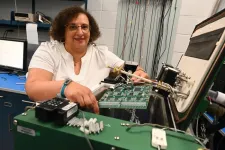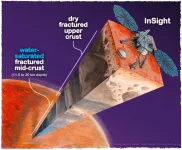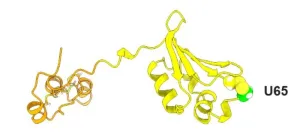(Press-News.org) A National Institutes of Health (NIH)-supported study has found that routine lab tests may not be useful in making a long COVID diagnosis for people who have symptoms of the condition. The study, part of NIH’s Researching COVID to Enhance Recovery (NIH RECOVER) Initiative and published in the Annals of Internal Medicine, highlights how challenging it can be to identify and diagnose a novel illness such as long COVID.
“Our challenge is to discover biomarkers that can help us quickly and accurately diagnose long COVID to ensure people struggling with this disease receive the most appropriate care as soon as possible,” said David Goff, M.D., Ph.D., director for the Division of Cardiovascular Sciences at the NIH’s National Heart, Lung, and Blood Institute. “Long COVID symptoms can prevent someone from returning to work or school, and may even make everyday tasks a burden, so the ability for rapid diagnosis is key.”
Long COVID encompasses a wide spectrum of symptoms and health conditions that persist for months or years after infection from SARS-CoV-2, the virus that causes COVID-19. No validated clinical biomarkers of long COVID have been found to date, so diagnosing the condition currently requires gathering a detailed medical history and having patients take a physical exam to understand their symptoms, as well as getting laboratory work to rule out other causes.
The researchers conducted the study to determine whether a SARS-CoV-2 infection led to changes in biomarkers, such as platelet counts or protein in the urine, in individuals with a prior SARS-CoV-2 infection, compared to those without prior infection.
More than 10,000 adults – part of the RECOVER Adult Cohort – were recruited at 83 enrolling sites across the U.S. between October 2021 and October 2023. The cohort is demographically diverse, and participants came from a range of geographic locations. Among the 8,746 who had a prior SARS-CoV-2 infection, many had different variants, while 1,348 had never been infected.
The RECOVER Adult Cohort includes both individuals with and without prior SARS-CoV-2 infection and individuals with and without long COVID. Nearly 19% of the study population were identified as having long COVID.
Study participants completed a baseline set of surveys, a physical examination, and 25 standard laboratory blood and urine tests. Participants were then followed throughout the two-year study period, taking surveys every three months and lab tests at six-, 12-, 24-, 36-, and 48-month intervals. The lab tests included a complete blood count panel, metabolic panel, hemoglobin A1c (HbA1c), urinalysis, and urine albumin to creatinine ratio (uACR), among others.
According to the researchers, the lab tests detected markedly few differences in biomarkers between those with prior infection and those without. However, the team did find that prior infection was associated with modest increases in HbA1c, a measure of average blood sugar levels over two to three months, though those increases disappeared after researchers excluded people with pre-existing diabetes.
The researchers also noted slightly elevated increases in uACR, a measure of low kidney function, in participants with previous infection, but those were only seen in a minority of people in that group and may have resulted from severity of the initial infection.
In a secondary analysis, the researchers looked solely at the individuals in the infected group to determine the differences between those who developed long COVID versus those who did not. They used a previously described long COVID index, which identified 12 symptoms that best identified people with long COVID. Among participants with prior infection, the study found no meaningful differences in lab test results between the two groups.
“Future work will use RECOVER’s biobank of cohort samples such as blood and spinal fluid, to develop more novel laboratory-based tests that help us better understand the pathophysiology of long COVID,” said Kristine Erlandson, M.D., professor of medicine-infectious disease at the University of Colorado Anschutz Medical Campus, Aurora.
Research reported in this press release was supported by NIH under award numbers OT2HL161841, OT2HL161847, and OT2HL156812. Additional support came from grant R01 HL162373. The content is solely the responsibility of the authors and does not necessarily represent the official views of the NIH. For more information on RECOVER, visit https://recovercovid.org.
STUDY: Erlandson KM, Geng LN, Selvaggi CA, et al. Standard Clinical Laboratory Measurements Do Not Differentiate Prior SARS CoV-2 Infection and Post-Acute Sequelae among Adults in the RECOVER Cohort. Annals of Internal Medicine. 2024. DOI: 10.7326/M24-0737
# # #
About RECOVER: The National Institutes of Health Researching COVID to Enhance Recovery (NIH RECOVER) Initiative brings together clinicians, scientists, caregivers, patients, and community members to understand, diagnose, and treat long COVID. RECOVER has created one of the largest and most diverse groups of Long COVID study participants in the world. In addition, RECOVER clinical trials are testing potential interventions across five symptom focus areas. For more information, please visit recoverCOVID.org.
About the National Institutes of Health (NIH): NIH, the nation's medical research agency, includes 27 Institutes and Centers and is a component of the U.S. Department of Health and Human Services (HHS). NIH is the primary federal agency conducting and supporting basic, clinical, and translational medical research, and is investigating the causes, treatments, and cures for both common and rare diseases. For more information about NIH and its programs, visit www.nih.gov.
HHS Long COVID Coordination: This work is a part of the National Research Action Plan (PDF, 1.3 MB), a broader government-wide effort in response to the Presidential Memorandum directing the Secretary for the Department of Health and Human Services to mount a full and effective response to Long COVID. Led by Assistant Secretary for Health Admiral Rachel Levine, the Plan and its companion Services and Supports for Longer-term Impacts of COVID-19 report (PDF, 1.6 MB) lay the groundwork to advance progress in the prevention, diagnosis, treatment, and provision of services for individuals experiencing Long COVID
END
Since the first demonstration of the laser in the 1960s, laser spectroscopy has become an essential tool for studying the detailed structures and dynamics of atoms and molecules. Advances in laser technology have further enhanced its capabilities. There are two main types of laser spectroscopy: frequency comb-based laser spectroscopy and tunable continuous-wave (CW) laser spectroscopy.
Comb-based laser spectroscopy enables extremely precise frequency measurements, with an accuracy of up to 18 digits. This remarkable precision led to ...
Recent large-scale epidemiologic studies have increasingly suggested that aberrant brain development and psychiatric disorders may share common mechanisms. The interplay between genetic variants and environmental stress has been shown to significantly impact genome integrity, reshaping brain development. This can result in changes to neural networks, which are linked to neurodevelopmental and psychiatric disorders—areas where many questions remain unresolved.
For more information, visit: bit.ly/4ddJSV0
For contributing article to this research topic, visit: bit.ly/4crNG41
Please use the Hot-Topic Code: BMS-CMP-2024-HT-33 ...
WASHINGTON, D.C. – Four of the nation’s top scientists have each been awarded $1 million in direct funding via the Department of Energy (DOE) Office of Science Distinguished Scientist Fellows program.
The program was established to develop, sustain, and promote scientific and academic excellence in Office of Science (SC) research through collaborations between universities and national laboratories.
The awards, authorized by the America COMPETES act, are bestowed on senior national laboratory scientists. The United States has ...
UPTON, N.Y. — Physicist Mary Bishai of the U.S. Department of Energy’s (DOE) Brookhaven National Laboratory has been named a 2024 DOE Office of Science Distinguished Scientist Fellow. The honor recognizes her “enduring contributions at the intensity frontier of high energy physics in unraveling fundamental properties of neutrinos, extraordinary leadership and service to the particle physics community, and deep commitment to broadening participation through mentoring next generation scientists.”
As described in a DOE Office of Science press release issued today, the ...
People suffering from cirrhosis may find some symptom relief from two accessible activities: stretching and meditation.
A study from the University of Michigan compared the two therapies as a means to relieve nocturnal muscle cramps and found both effective.
The resulting paper, “The RELAX randomized controlled trial: Stretching versus meditation for nocturnal muscle cramps,” appeared in Liver International.
The study
Two out of every three people with cirrhosis experience muscle cramps at night that wake them from sleep.
Since ...
Respiratory infections can be severe, even deadly, in some individuals, but not in others. Scientists at St. Jude Children’s Research Hospital, the Peter Doherty Institute for Infection and Immunity and other collaborators have gained new understanding of why this is the case by uncovering an early molecular driver that underpins fatal disease. Oleoyl-ACP-hydrolase (OLAH) is an enzyme involved in fatty acid metabolism. A study, published today in Cell, shows that OLAH drives severe disease outcomes.
The important role of OLAH in immune response has gone unrecognized for several reasons, including a lack of noticeable expression in healthy ...
Microwave irradiation technology is emerging as a powerful tool in the fields of organic synthesis, pharmaceuticals, and nanocarrier development. Recently, microwave-assisted reactions have gained significant attention for their effectiveness in synthesizing drug delivery carriers. This technology offers notable advantages, including high yield, shorter reaction times, and improved compound purity, making it a promising approach for developing nanoparticles with enhanced physicochemical properties and bioavailability.
For more information, please visit: bit.ly/3SFk4cf
For contributing article in this research topic, visit: bit.ly/3WXyoza
Use ...
Data about Mars’ planetary crust gathered from the Mars InSight lander are best explained by the conclusion that the crust has stores of liquid water.
Analysis led by Vashan Wright, a geophysicist at UC San Diego’s Scripps Institution of Oceanography, provides the best evidence to date that the planet still has liquid water in addition to that frozen at its poles. If that conclusion is true, it sets the stage for new research considering the planet’s habitability and continuing a search for life that exists on a place other than Earth. The potential presence of liquid water on Mars has tantalized scientists for decades. Water is essential for a habitable planet.
“Understanding ...
Using seismic activity to probe the interior of Mars, geophysicists have found evidence for a large underground reservoir of liquid water — enough to fill oceans on the planet's surface.
The data from NASA's Insight lander allowed the scientists to estimate that the amount of groundwater could cover the entire planet to a depth of between 1 and 2 kilometers, or about a mile.
While that’s good news for those tracking the fate of water on the planet after its oceans disappeared more than 3 billion years ago, the reservoir won't be of much use to anyone trying to tap into it to supply a future Mars colony. It's ...
AMHERST, Mass. – Anyone who’s tried to neatly gather a fitted sheet can tell you: folding is hard. Get it wrong with your laundry and the result can be a crumpled, wrinkled mess of fabric, but when folding fails among the approximately 7,000 proteins with an origami-like complexity that regulate essential cellular functions, the result can lead to one of a multitude of serious diseases ranging from emphysema and cystic fibrosis to Alzheimer’s disease. Fortunately, our bodies have a quality-control system ...





